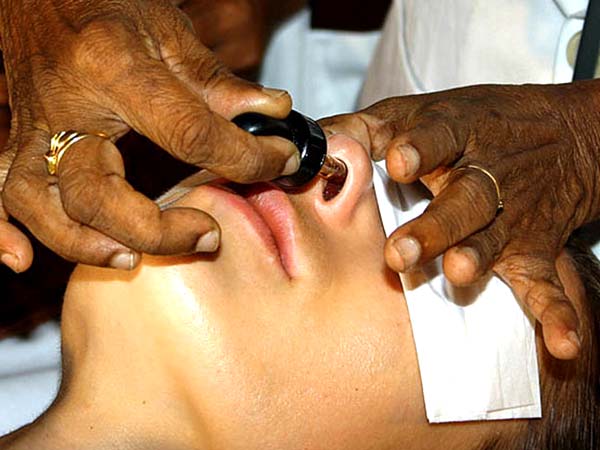Treatment of drug through nostrils is known as Nasya Karma. Here are some basic information on Nasya Karma Threpay Nasal Insufflations.
Nasya Karma
One of the Panchakarmas mentioned in Ayurveda, Nasya therapy is a process wherein the drug (herbalized oils and liquid medicines) is administered through the nostrils. Since nose is the gateway of the head, the therapy is highly effective in curing a number of diseases pertaining to the head, if it is performed systematically. The therapy cleanses and opens the channels of the head, thereby improving the process of oxygenation (prana), which has a direct influence on the functioning of brain. The therapy is beneficial if done on a regular basis, because it keeps the eyes, nose and ear healthy. It also prevents the early graying of hair and bear. Read on to know more about Nasa karma, a therapy of Panchakarma.
Benefits Of Nasya Karma
- Nasya karma ensures the proper and healthy growth of hair.
- The therapy enhances the activity of sense organs and protects the person from diseases pertaining to head (urdhwanga)
- Early aging process is effectively prevented by the regular administration of Nasya karma
Types Of Nasya Karma
- Pradhamana (virechan) Nasya (cleansing nasya): In this type of Nasya karma, dry powders (rather than oils) are blown into the nose with the help of a tube. Pradhamana nasya is mainly used to treat kapha types of diseases such as headaches, heaviness in the head, cold, nasal congestion, sticky eyes and hoarseness of voice due to sticky kapha, sinusitis. Chronic diseases such as cervical lymph adenitis and tumors can also be treated by Pradhaman Nasya. Some skin diseases are easily treated by this type of Nasya karma. Epilepsy, drowsiness, Parkinsonism, inflammation of the nasal mucosa, attachment, greed and lust can be effectively treated by the therapy. Powders such as brahmi are traditionally used in this therapy.
- Bruhana Nasya (nutrition nasya): This treatment uses ghee, oils, salt, shatavari ghee, ashwagandha ghee and medicated milk to cure vata disorders. Studies suggest that it is beneficial to cure vata-type headaches, migraine headache, dryness of voice, dry nose, nervousness, anxiety, fear, dizziness and emptiness. Negative thoughts can be banished by undergoing this treatment. In case of the person is suffering from heaviness of eyelids, bursitis, stiffness in the neck, dry sinuses and loss of sense of smell, Bruhana Nasya would be the best bet.
- Shaman Nasya (Sedative Nasya): Sedative Nasya is used according to which dosha is aggravated in the human body. It is mainly administered to treat pitta-type disorders such as thinning of hair, conjunctivitis and ringing in the ears. Generally, herbal medicated decoctions, teas and medicated oils are used as the medicine in this type of Nasya karma.
- Navana Nasya (Decoction Nasya): This type of therapy is used in vata-pitta or kapha-pitta disorders. Decoctions and medicated oils are poured through the nostrils of the person undergoing the treatment.
- Marshya Nasya (Ghee Or Oil Nasya): This type of Marshya Nasya karma makes use of ghee/oil. The therapy is administered for a particular reason, which may not be disease, but a condition of uneasiness arising from a particular disease.
- Pratimarshya (Daily Oil Nasya): This type of therapy is administered by dipping the clean little finger in ghee or oil and inserting into each nostril. After inserting the clean finger (dipped in ghee or oil) into the nostril, the nasal passage is lubricated and given a gentle massage. By doing this, the deep nasal tissues are opened up. By doing Pratimarshya on a regular basis, stress can be released to a great extent.
Diseases Treated Under Nasya Therapy
- Aphonia
- Bronchitis
- Cataract
- Catarrh
- Chronic coryza
- Coryza
- Diseases of mouth, nose, ear, eye and head
- Diseases of the eyelid
- Dryness Of The Nose
- Facial Paralysis
- Frozen Shoulder
- Hemi Crania
- Hoarseness of voice
- Hysteria
- Migraine
- Multiple Sclerosis
- Parkinsonism
- Seminal disorders
- Shoulder pain
- Sinus Congestion
- Sinusitis
- Stammering
- Stiffness in the head, neck, teeth and jaw
- Tetanus
- Tonsilitis
- Toothache and other tooth disorders
- Uvulitis



